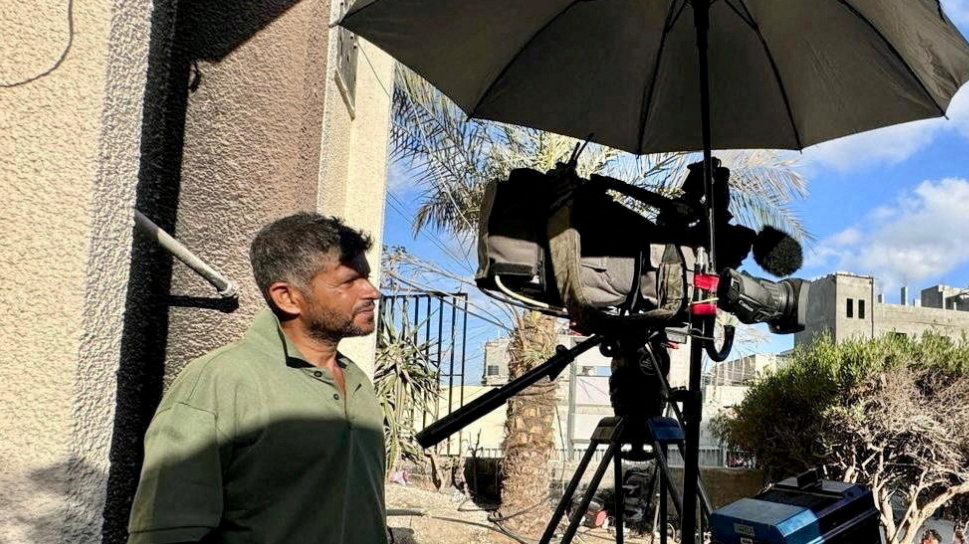Russia targets Ukraine energy infrastructure in overnight strikes
Russia launched overnight drone and missile strikes across Ukraine, targeting energy infrastructure in multiple regions, Ukrainian authorities said on...

Hussam al-Masri, a Reuters cameraman who was killed Monday at Gaza’s Nasser Hospital, had spent months capturing the daily hardships of civilians while living in a makeshift tent and struggling to provide for his family.
An experienced and well-respected journalist, Masri was known among Gaza’s reporting community for his optimism.
“Tomorrow will be better,” he often said, even as conditions in the Strip deteriorated, according to Mohamed Salem, a senior visuals journalist who had worked with Masri since 2003.
“His optimism and smiles made him a pleasure to work with,” Salem said.
Born and raised in Khan Younis, he earned a diploma in journalism before starting work as a freelancer in 1998, including for the Palestinian Broadcasting Corporation.
“This was Hussam’s role in the media - to deliver the truth to the outlets,” his brother, Ezzeldin al-Masri, said.
Masri began working for Reuters in May 2024, covering displacement camps and humanitarian aid deliveries near the Rafah border. Since returning to Khan Younis, he managed the live feed from Nasser Hospital, providing real-time visuals of Gaza to Reuters clients worldwide.
“Hussam has done this gruelling task day in and day out for months, mainly from Nasser Hospital but also from Rafah when the story merited it,” said Labib Nasir, Reuters visual editor for the Middle East and North Africa.
He reported extensively on southern Gaza, including stories on malnutrition in areas now officially experiencing famine. His last report, filmed Saturday, showed families mourning relatives, including children, killed in Israeli strikes that have claimed at least 62,000 Palestinian lives in the conflict.
Masri chose Nasser Hospital for its relative safety, Salem said.
His body was recovered alongside his camera in an external stairwell at Nasser Hospital, from where he had been broadcasting across Khan Younis when the Israeli strike hit. A second blast minutes later killed at least 19 people, including rescue workers and four journalists from outlets including the Associated Press and Al Jazeera.
Reuters photographer Hatem Khaled was injured in the second strike.
In their final conversation, Masri spoke of the difficulty of daily life and the struggle to find food in Gaza. Hours later, his body was photographed on a stretcher by Reuters.
The 49-year-old leaves behind his wife, Samahar and their four children.
Reuters editor-in-chief Alessandra Galloni said, “Hussam was deeply devoted to telling the story of Gaza to the world. He was strong, steady and courageous in the most challenging of circumstances. His loss is deeply felt by all of those in this newsroom who worked with him.”
Israel’s military told Reuters that journalists were not a target of the strike. Israeli Prime Minister Benjamin Netanyahu said Israel deeply regretted what he called a “tragic mishap.”
The Committee to Protect Journalists said the strikes bring the total number of Palestinian journalists killed during the conflict to 189 and called for the international community to hold Israel accountable.
A seven-month-old Japanese macaque has drawn international attention after forming an unusual bond with a stuffed orangutan toy after being rejected by its mother.
Quentin Griffiths, co-founder of online fashion retailer ASOS, has died in Pattaya, Thailand, after falling from the 17th floor of a condominium on 9 February, Thai police confirmed.
Divers have recovered the bodies of seven Chinese tourists and a Russian driver after their minibus broke through the ice of on Lake Baikal in Russia, authorities said.
President Donald Trump said on Saturday (21 February) that he will raise temporary tariffs on nearly all U.S. imports from 10% to 15%, the maximum allowed under the law, after the Supreme Court struck down his previous tariff program.
Hungary announced on Friday it was blocking a €90 billion ($106 billion) European Union loan intended to support Ukraine’s 2026–2027 budget and military needs, citing disruptions to Russian oil deliveries via the Druzhba pipeline.
U.S. President Donald Trump said he plans to send a hospital ship to Greenland with Louisiana Governor Jeff Landry, drawing a quick rejection from Greenland’s prime minister.
U.S. Secret Service and local police shot and killed a man armed with a shotgun early on Sunday after he breached a secure perimeter at President Donald Trump’s Mar-a-Lago resort in Palm Beach, Florida, law enforcement officials said.
U.S. President Donald Trump is weighing why Tehran has not moved toward limiting its nuclear programme even as Washington expands its military presence across the Middle East.
Comments by U.S. Ambassador to Israel Mike Huckabee suggesting that Israel had a biblical right to much of the Middle East drew condemnation over the weekend from countries across the region, which described the remarks as “dangerous and inflammatory”.
Brazilian President Luiz Inácio Lula da Silva has said he will urge U.S. President Donald Trump to avoid a "new Cold War" when the two leaders meet in Washington next month.
You can download the AnewZ application from Play Store and the App Store.

What is your opinion on this topic?
Leave the first comment